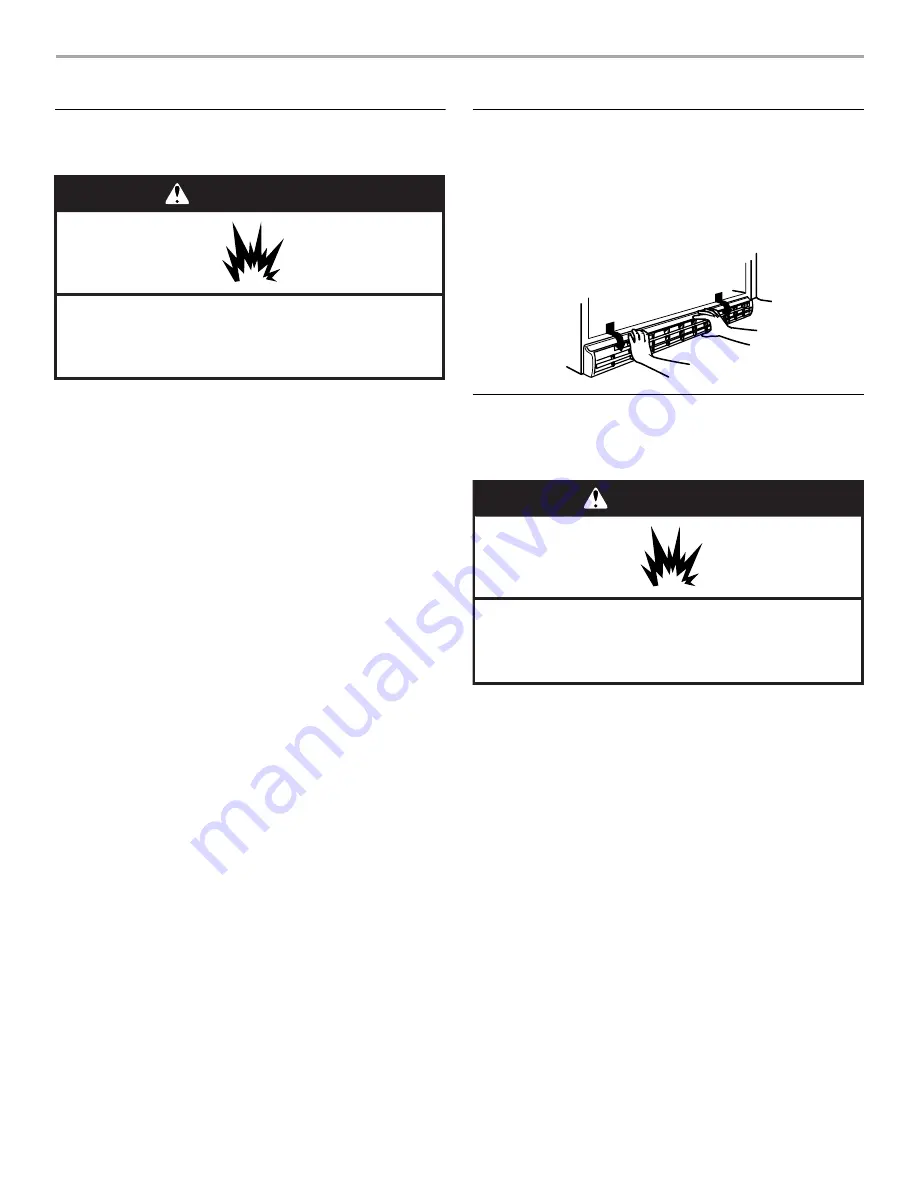
9
FREEZER CARE
Cleaning Your Frost-Free Freezer
(some models)
Frost-free means that you will not have to defrost your freezer.
Frost is removed by air moving and collecting any moisture and
depositing it on the cooling coil. The cooling coil periodically
warms up enough to melt the frost, and it then flows down to the
drain pan (located behind the base grille) where it is evaporated.
Complete cleaning should be done at least once a year.
1. Unplug freezer or disconnect power.
2. Remove all frozen food. Wrap frozen food in several layers of
newspaper and cover with a blanket. Food will stay frozen for
several hours. You may also store frozen food in a cooler,
additional refrigerator-freezer, or in a cool area.
3. Wash the inside walls with a solution of mild detergent in
warm water or 2 tbs (26 mg) baking soda to 1 qt (0.95 L) warm
water.
■
Do not use abrasive or harsh cleaners such as window
sprays, scouring cleansers, flammable fluids, cleaning
waxes, concentrated detergents, bleaches or cleansers
containing petroleum products on plastic parts, interior
and door liners or gaskets. Do not use paper towels,
scouring pads, or other harsh cleaning tools. These can
scratch or damage materials.
4. Rinse well and wipe dry with a clean soft cloth.
5. Use the appropriate cleaning method for your exterior finish.
Painted metal: Wash exteriors with a clean sponge or soft
cloth and a mild detergent in warm water. Do not use abrasive
or harsh cleaners, or cleaners designed for stainless steel. Dry
thoroughly with a soft cloth.
Stainless steel finish: Wash with a clean sponge or soft cloth
and a mild detergent in warm water. Do not use abrasive or
harsh cleaners. Dry thoroughly with a soft cloth.
■
To keep your stainless steel refrigerator looking like new
and to remove minor scuffs or marks, it is suggested that
you use the manufacturer’s approved Stainless Steel
Cleaner and Polish.
IMPORTANT: This cleaner is for stainless steel parts only!
■
Do not allow the Stainless Steel Cleaner and Polish to
come into contact with any plastic parts such as the trim
pieces, dispenser covers or door gaskets. If unintentional
contact does occur, clean plastic part with a sponge and
mild detergent in warm water. Dry thoroughly with a soft
cloth.
6. Replace all frozen food.
7. Plug in freezer or reconnect power.
8. See “Using the Control.”
Base Grille
To Remove and Replace the Base Grille:
1. Open the freezer door and remove the base grille by pulling
down and out from the top.
2. Replace the base grille by putting the clips in the openings in
the refrigerator panel. Push in until the base grille snaps into
place.
Defrosting and Cleaning
Your Manual Defrost Freezer
(some models)
Defrost and clean your freezer when frost has built up to about
¹⁄₄
" (6 mm) thickness. Complete defrosting and cleaning should be
done at least once a year. In high humidity areas, a freezer may
need more frequent defrosting and cleaning.
Do not use abrasive cleaners on your freezer. Do not use cleaning
waxes, concentrated detergents, bleaches, or cleaners containing
petroleum on plastic parts. Damage can occur.
NOTE: The drain cap must be removed before defrosting the
freezer and replaced securely afterward.
1. Unplug freezer or disconnect power.
2. Remove all frozen food. Wrap frozen food in several layers of
newspaper and cover with a blanket. Food will stay frozen for
several hours. You may also store frozen food in a cooler, an
additional refrigerator or freezer, or a cool area.
3. Remove base grille. See “Base Grille.”
WARNING
Explosion Hazard
Use nonflammable cleaner.
Failure to do so can result in death, explosion, or fire.
WARNING
Explosion Hazard
Use nonflammable cleaner.
Failure to do so can result in death, explosion, or fire.
Summary of Contents for Designer DUF501WDD
Page 26: ...26 Notes...










































